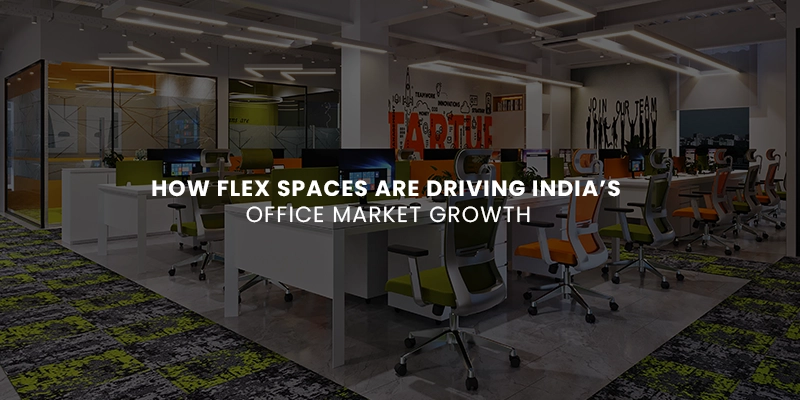How Flex Spaces Are Driving India’s Office Market Growth
How Flex Spaces Are Driving India’s Office Market Growth
India’s office market is undergoing a remarkable transformation, driven by the rising adoption of flexible office spaces. Traditional long-term leased offices are gradually giving way to co-working hubs, serviced offices, and plug-and-play setups that offer scalability, cost efficiency, and modern amenities. Businesses across all sizes from startups to large enterprises are leveraging these spaces to adapt to changing workforce needs, reduce overheads, and boost productivity. This shift is not only propelling the growth of India’s office real estate market but also redefining how companies plan, operate, and scale their office infrastructure.
Understanding Flexible Office Spaces
Flexible office spaces, also known as co-working or serviced offices, are designed to provide complete office solutions without the constraints of traditional leases. These spaces typically offer:
- Short-term leases and scalable setups
- Shared amenities like meeting rooms, lounges, and high-speed internet
- Technology-enabled infrastructure for seamless operations
- Community-driven environments that encourage collaboration
The key advantage of flex spaces is their ability to combine operational convenience with a professional office environment, allowing businesses to focus on growth instead of administrative challenges.
Why Flex Spaces Are Gaining Popularity in India
The rise of flexible office spaces in India is fuelled by several factors:
Post-Pandemic Work Culture
The pandemic accelerated the adoption of hybrid work models, creating demand for adaptable office solutions. Companies now prefer spaces that can easily scale up or down depending on workforce requirements.
Startups and SMEs
For startups and small-to-medium enterprises, flex offices provide plug-and-play infrastructure with minimal upfront investment. They allow businesses to operate in premium office spaces without the financial burden of long-term leases or heavy capital expenditure.
Large Enterprises
Even large corporations are adopting flex spaces for satellite offices, regional expansion, or testing new markets. These offices offer agility and operational flexibility, enabling faster deployment in strategic locations.
Cost Efficiency and Amenities
Flex spaces reduce capital and operational expenses compared to conventional offices. Modern amenities like meeting rooms, IT support, and community events enhance employee experience and productivity, making these spaces highly attractive to diverse business segments.
Impact on India’s Office Market
The adoption of flexible office solutions is reshaping India’s commercial real estate landscape:
Increased Occupancy Rates
Flex spaces help absorb surplus demand and reduce vacancy rates in commercial buildings, ensuring optimal utilization of office infrastructure.
Expansion into Tier-2 and Tier-3 Cities
These cities are emerging as key hubs for flexible offices, offering businesses opportunities to establish regional offices and tap into local talent pools.
Market Growth and Investment Opportunities
With the rise of co-working operators and managed office providers, investors are increasingly drawn to India’s commercial real estate market. Flex spaces offer predictable demand and scalability, making them an attractive investment option.
Benefits for Businesses
Flexible office spaces offer numerous advantages:
- Scalability: Businesses can adjust office size as teams grow or shrink.
- Agility: Quick setup allows faster go-to-market for new operations.
- Collaboration and Networking: Shared spaces foster innovation and employee engagement.
- Sustainability: Optimized use of shared resources reduces environmental impact and operational costs.
By offering these benefits, flex spaces empower companies to operate more efficiently while providing employees with a modern, connected workspace.
The Future of Flex Spaces in India
The outlook for flexible office spaces in India remains highly promising. Adoption is expected to expand beyond major metro cities into Tier-2 and Tier-3 locations. Technology integration, such as IoT-enabled facilities and AI-driven resource management, is further enhancing the efficiency of these spaces. With hybrid work becoming mainstream, flexible offices are increasingly becoming a critical component of corporate real estate strategy, enabling businesses to adapt to evolving workforce expectations.
Conclusion
Flexible office spaces are no longer a niche concept; they are driving India’s office market growth. By offering adaptability, cost efficiency, and state-of-the-art infrastructure, flex spaces allow businesses to scale efficiently while supporting a dynamic workforce. Leveraging solutions from The Office Address can further enhance these advantages by providing prestigious business locations, professional services, and seamless operations, helping companies establish a strong presence without the overhead of a traditional office.
